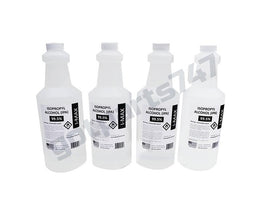Hand sanitizers are far from a new development. Many hygiene conscious people have been using them for years, while they have also been used in environments like hospitals and care centers where hygiene is paramount. Thanks to COVID, however, we have seen the production and distribution of hand sanitizers proliferate as governments and individuals do what they can to help prevent the spread of the virus.
One of the ingredients found in many hand sanitizers is alcohol, which might raise concerns among some people. The alcohol is there for a good reason, however, and is usually completely safe provided the hand sanitizer is used appropriately. Here’s a look at why alcohol in hand sanitizer is so common, and what risks are involved.
Why is Alcohol Added to Hand Sanitizer?
The simple answer to the question is that alcohol is added to hand sanitizer because it kills germs. Such is the effectiveness of alcohol at killing germs that it was used in the past to help treat wounds to help prevent infections. Even today, alcohol is sometimes used to treat wounds and sterilize equipment if modern methods are not available.
Sanitizers that contain more alcohol tend to be more effective at killing germs. Indeed, it’s recommended that hand sanitizers should use at around 60% - 70% alcohol to help ensure they’re effective.
How Does Alcohol Kill Germs?
Alcohol works similarly to warm, soapy water when it comes to killing germs. Soap is an emulsifier, meaning it allows fat to mix with water. Many germs have an outside protective layer that is made up at least partly of lipids – which is a technical term for fat. Therefore, when these germs come into contact with warm soapy water, their protective layers dissolve, killing the germ outright.
Alcohol also works by breaking down a germ’s outer protective layer in a process known as denaturation. In essence, alcohol causes germs to fall apart, killing them in the process. Not only can alcohol kill germs on our hands, but also on surfaces that might also be contaminated.
Can Hand Sanitizer Keep us Safe from Disease?
Yes, hand sanitizer can stop the spread of diseases, or at least help to slow down the spread. When a person exhales, or coughs or sneezes, droplets containing germs can land on surfaces around them. When somebody else comes along they can inadvertently pick up these germs if they touch contaminated surfaces and, if they touch their face, the germs may be able to make their way into the body and potentially make the person ill.
Remember that hand sanitizers are not the only form of defense against diseases. Wearing face masks can also help to limit the spread of disease, while keeping our distance from other people is another effective method of limiting how much disease can spread.
What Are the Ingredients of a Hand Sanitizer?
As mentioned, it is recommended that hand sanitizers contain at least 60% - 70% alcohol. Isopropyl is one of the most commonly seen alcohol ingredients of hand sanitizers, with around 70% IPA concentration being most effective at killing bacteria due to the balance between water and alcohol. In this case, the 70% solution can penetrate the outside layer of a microbe and kill it. If the concentration of alcohol was too high, the solution would simply destroy the outer layer instead of killing the whole thing. This is why 60% - 75% concentrations are recommended.
Other ingredients in hand sanitizers include hydrogen peroxide and glycerin that also help to kill germs and sterile water is another ingredient. Some hand sanitizers will have scents added to them, as well as chemicals that make the sanitizer taste bad to deter people from consuming them. If you’re planning on using a hand sanitizer that doesn’t come from a well-known brand, it’s a good idea to check the ingredients first.
Are Alcohol-Based Hand Sanitizers Safe to Use?
Generally speaking, ethanol or isopropyl alcohol hand-sanitizers are very safe to use and you should not expect to experience any negative side effects. Methanol or 1-propanol, however, should be avoided at all costs due to their toxic properties.
Some people might find their skin becomes irritated after using a hand sanitizer, in which case they should stop using it straight away. Hand sanitizers can also make the skin more sensitive to ultraviolet rays and are very flammable so they should be kept away from naked flames.
Alcohol-based hand sanitizers are also incredibly dangerous to consume, which is why you should keep them away from children or pets.
--
When buying an Isopropyl-based hand sanitizer, check the label to be sure it contains at least 70% alcohol. If it contains any less, then it’s unlikely to be as effective as it should be. Likewise, if the alcohol content is very high (80 - 90% +) it is likely to be less effective at killing microbes.
Remember that it’s not only COVID that hand sanitizers protect us against but most other diseases as well. Using a hand sanitizer is also not just about keeping you safe, but also about keeping other people safe, including your loved ones.

